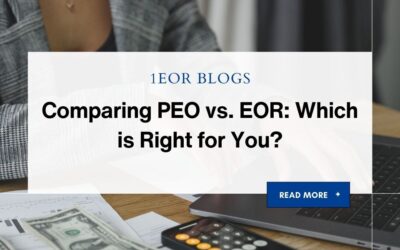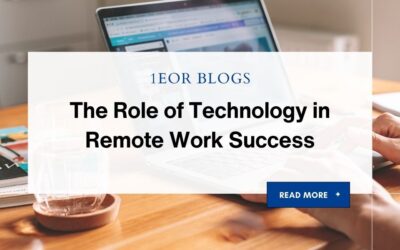In today’s interconnected world, companies often find themselves managing teams across multiple countries. To navigate the complexities of global employment, many businesses partner with either a Professional Employer Organization (PEO) or an Employer of Record (EOR). Understanding the key differences between a PEO and an EOR is crucial for making an informed decision that aligns with your company’s unique needs.
What is a Professional Employer Organization (PEO)?
A PEO acts as a co-employer, essentially functioning as an outsourced HR department for your business. This partnership is particularly beneficial for small and medium-sized enterprises (SMEs) that require assistance with full-time, permanent employees in their local region. A PEO manages various HR tasks, such as:
- Payroll processing
- Benefits administration
- Regulatory compliance
- Tax filings
By offloading these responsibilities to a PEO, your internal teams can concentrate on core business activities. However, it’s important to note that while a PEO handles HR functions, your company remains the official employer, responsible for legal and operational obligations, including business registration where you hire talent.
What is an Employer of Record (EOR)?
An EOR, sometimes referred to as a global PEO, is the legal employer of your distributed workforce in regions where your business does not have an established entity. This setup allows you to maintain a direct relationship with your employees while the EOR manages all employer-related responsibilities, such as:
- Local onboarding processes
- Payroll management
- Tax compliance
- Benefits administration
- Handling unemployment claims
An EOR offers a streamlined approach to quickly and compliantly hiring talent across borders without the need for local business registration. This can significantly reduce the time, complexity, and cost associated with expanding your workforce globally.
PEO vs. EOR: 5 Key Differences
While both PEOs and EORs provide HR support, they differ in several critical areas:
- Structure:
- PEO: Acts as a co-employer, handling HR tasks while your company retains control over HR decisions.
- EOR: Serves as the legal employer, assuming full responsibility for HR decisions and compliance in the hiring location.
- Risk:
- PEO: Your company shares employment liabilities, including workplace safety risks.
- EOR: The EOR assumes all employment risks and liabilities, offering a layer of protection for your business.
- Scale:
- PEO: Best suited for companies with a significant number of full-time employees, often requiring a minimum employee count to access certain benefits.
- EOR: Ideal for businesses with temporary employees or those hiring in multiple locations, with no minimum employee requirements.
- Scope:
- PEO: Operates in regions where your company already has an entity, making your business responsible for local compliance.
- EOR: Provides comprehensive local expertise and compliance management, facilitating multi-state or multinational expansions without the need for new entities.
- Cost:
- PEO: Typically involves upfront and ongoing fees, with your company responsible for additional costs like insurance and benefits.
- EOR: Generally more cost-effective long-term, covering insurance and benefits for your distributed workforce, thereby reducing additional expenses.
Deciding Between a PEO and EOR
When deciding between a Professional Employer Organization (PEO) and an Employer of Record (EOR), it’s essential to carefully evaluate various factors to determine the most suitable option for your business’s specific needs and objectives. The following considerations are crucial in making an informed decision:
1. Business Goals and Growth Strategy
Begin by examining your business’s short-term and long-term goals, as well as its overall growth strategy. If international expansion is part of your future plans, an EOR might be the ideal choice. EORs provide a streamlined solution for managing a global workforce, handling international compliance, payroll, and other administrative tasks. Conversely, if your primary focus is on domestic growth and scaling operations within your home country, a PEO could offer the comprehensive HR support necessary to manage an increasing number of employees and the accompanying operational complexities.
2. Scope of Services Needed
Determining the specific HR functions and services your business requires is a critical step. PEOs typically offer a broad range of HR solutions, including payroll processing, benefits administration, compliance assistance, risk management, and employee relations support. A PEO can be the best choice if your company need a comprehensive set of HR services for domestic operations. However, if your primary requirement is for compliance and administrative support during international expansion, an EOR specializing in global employment would be more appropriate. EORs focus on ensuring compliance with foreign labor laws, managing payroll in multiple currencies, and addressing other international HR challenges.
3. Budgetary Considerations
Understanding the cost implications of each option and how they fit within your budgetary constraints is crucial. PEOs normally charge a fixed fee per employee or a percentage of the total payroll expenses. While PEOs may entail higher upfront costs, they provide comprehensive HR solutions that can be cost-effective in the long run, especially for domestic operations. On the other hand, EORs usually charge a fee per employee or a flat rate based on the services provided. They focus primarily on assuming legal employer status for your employees, which can be particularly cost-effective for international operations where compliance complexities are higher. The overall cost-effectiveness of each model depends on factors such as the size of your workforce, the scope of services needed, and the complexity of compliance requirements.
4. Geographic Expansion Plans
Consider your business’s geographic expansion plans, whether they involve domestic or international growth. If you are contemplating international expansion, an EOR specializing in global employment can provide valuable support in navigating foreign labor laws and ensuring compliance in new markets. EORs are equipped to handle the intricacies of international payroll, benefits, and regulatory requirements, making them ideal for businesses looking to establish a presence in multiple countries. Conversely, if your business is primarily focused on domestic operations, a PEO may offer the comprehensive HR solutions needed to manage growth within your home country, including payroll processing, benefits administration, and compliance support.
5. Risk Tolerance and Control
Evaluate your business’s risk tolerance and preference for control over HR functions. PEOs operate under a co-employment model, where they share employer responsibilities with client businesses. This arrangement provides access to extensive HR support, but it also means that businesses may relinquish some control over certain HR functions. PEOs handle a wide range of HR tasks, from payroll processing to compliance management, allowing businesses to focus on core operations. However, the co-employment relationship can sometimes lead to a loss of direct control over certain HR decisions.
In contrast, EORs assume full legal employer status for your employees, which provides greater control over employment-related matters and minimizes risks associated with compliance. With an EOR, your business retains full control over day-to-day management while the EOR handles payroll, benefits, and compliance. This model is particularly beneficial for businesses with a high-risk tolerance and a desire to maintain control over HR functions while ensuring compliance with international regulations.
PEO vs. EOR: Making the Right Choice
Hiring top talent across borders involves navigating complex and evolving regulations. Failing to comply with local labor laws can result in regulatory issues, fines, and the loss of valuable talent. If your goal is to enter new markets swiftly and avoid the intricacies of entity establishment, partnering with an experienced EOR can provide the necessary infrastructure and expertise.
In conclusion, both PEOs and EORs offer distinct advantages depending on your company’s needs. By carefully evaluating your workforce size, company footprint, and long-term strategic goals, you can choose the solution that best supports your global expansion efforts.
Conclusion
Deciding between a PEO and an EOR involves a thorough assessment of your business’s goals, growth strategy, scope of services needed, budgetary considerations, geographic expansion plans, and risk tolerance. By carefully evaluating these factors, you can determine which option aligns best with your unique needs and objectives.
Professional Employer Organization (PEO):
- Ideal for businesses focused on domestic growth.
- Provides comprehensive HR solutions including payroll processing, benefits administration, compliance assistance, and risk management.
- Operates on a fee structure based on a percentage of total payroll costs or a flat fee per employee.
- Offers extensive HR support but may require relinquishing some control over certain HR functions.
- Suitable for businesses with a lower risk tolerance and a preference for bundled HR services.
Employer of Record (EOR):
- Suitable for businesses planning international expansion.
- Specializes in global employment, ensuring compliance with foreign labor laws, managing payroll in multiple currencies, and addressing international HR challenges.
- Charges a fee per employee or a flat rate based on services provided.
- Assumes full legal employer status, providing greater control over employment-related matters and minimizing compliance risks.
- Ideal for businesses with a higher risk tolerance and a desire to maintain control over HR functions while navigating international markets.
Ultimately, the choice between a PEO and an EOR will depend on your business’s specific needs and strategic objectives. By considering the factors outlined above, you can make an informed decision that supports your business’s growth and success.



